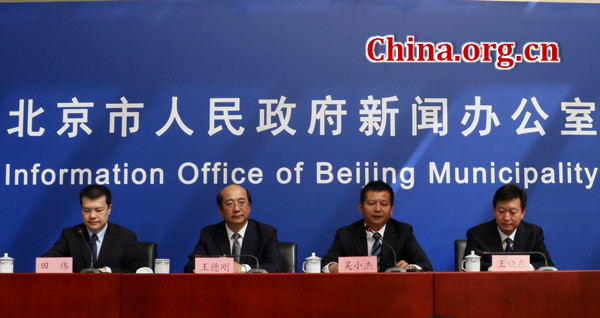From September 22-30, Beijing will host a high-profile leisure carnival, involving a leisure conference, an expo and a gala fashion show, Wu Xiaojie, deputy head of the capital’s Pinggu District, announced at a press conference in Beijing yesterday.
 |
|
Beijing will host a leisure conference as well as a leisure expo and gala show, according to a press conference held in Beijing on September 19. Wang Degang (second left), vice president of China Tourism Association, Wu Xiaojie (second right), deputy head of the capital’s Pinggu District and Wang Xiaodong (right), deputy head of Pinggu District attended the press conference.[Photo/China.org.cn by Guo Xiaohong]
|
The first China (Beijing) Leisure Conference will be held September 22-24, said Wu.
Under a theme of “leisure enhancing life quality,” the three-day conference will bring together hundreds of domestic and foreign experts, entrepreneurs and officials from international leisure organizations, travel associations, leisure-based enterprises and tourism cities.
They will explore new findings in leisure research and innovation, and share their experience on how to further promote the leisure industry through four academic forums that form part of the conference.
The leisure carnival will also include cultural and related events including the 2017 International Leisure Industry Expo and Leisure and Fashion Gala, showcasing the latest trends in leisure vogue, diversity and new products.
These activities will help people embrace a new lifestyle, and, in return, boost the leisure industry, Wang Degang, vice president of China Tourism Association, said at the same press conference.
“We have entered an era where leisure has become a new form of productivity,” said Wang.
He continued: “The leisure industry combines travel, sports, entertainment and the arts,” adding that he hoped it could become a contributor to people’s health and happiness while helping adjust the national economic structure.
According to Wu Xiaojie, Pinggu will stage two more such carnivals in 2018 and 2019 respectively as a prelude to convening the 16th World Leisure Conference in 2020.
Pinggu District, known as an area focusing on ecology with 66.5 percent of forest coverage, boasts a number of titles such as being a land of peaches, calligraphy and ornamental stones. It has designated leisure as its pillar industry and is fully geared up for the upcoming carnival, Wu said confidently.
The upcoming leisure is being organized by the China Tourism Association, Beijing Municipal Commission of Tourism Development and Pinggu District government, as well as the executive committee of the 2020 World Leisure Conference.
read more



![A giant QR code in north China’s Hebei Province has left people wondering what to make of the design, which can only be scanned from high above the ground.[Photo/Xinhua] A giant QR code in north China’s Hebei Province has left people wondering what to make of the design, which can only be scanned from high above the ground.[Photo/Xinhua]](http://images.china.cn/attachement/jpg/site1007/20170920/f44d307d90cc1b2c0ed609.jpg)